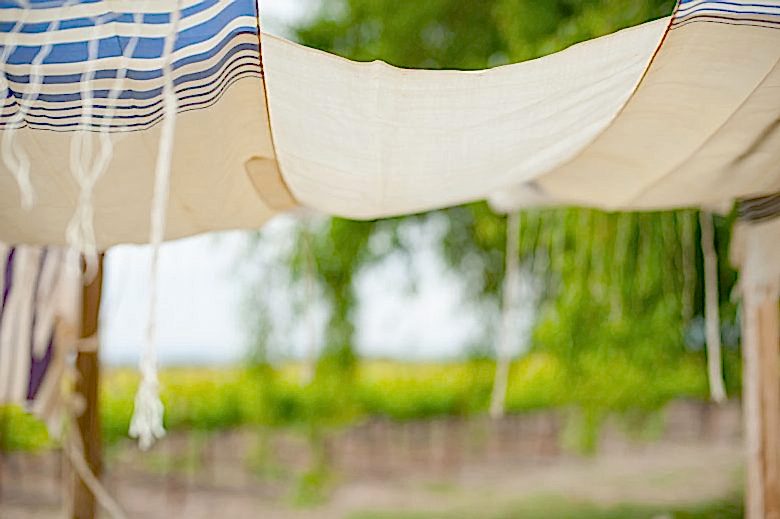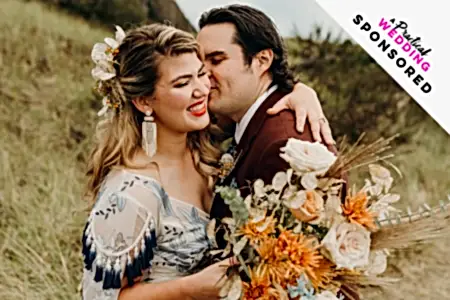
Periodically on APW, someone accuses me of being anti-tradition, and I get really sad. I talk about how we have a church weddings section. I talk about how we have a lot of brides wearing white. I talk about how I make sure there are posts supporting whatever choices you want to make, wherever they are on the spectrum.
Then I always point out that no matter how indie our wedding looked (the hip look was partially just good photographers, partially the fact that I wore a short dress), our wedding service was very traditional. We had *the* traditional Jewish service, with lots of Hebrew, lots of God-talk, the seven blessings in their original form, the traditional vows in Hebrew, the works. When you ask our wedding guests, they will describe the service as “very traditional,” but most of them also describe it as “very emotional.” People seem to see those things as diametrically opposed, so what gives?
I started to see the real answer when I was talking about this with Danae in the comments. She said:
“You think APW is pro-tradition because your definition of “traditional” is something along the lines of “we thought a lot about it and decided that we wanted to echo the centuries-old tradition of our cultures and beliefs,” and when someone else defines “traditional,” they mean, “we did what everyone expected us to do.”
And I was like, “OH! Right! Of course that’s what I think traditional means! Of course!” and then “Oh my god, that’s not what everyone else means when they say traditional? I didn’t get that.”
So. I thought maybe it was time to have a chat about having a really traditional ceremony (because that feels right to you) and rocking the hell out of it (because, of course!)
So first of all: traditional ceremonies do not have to be boring. Period. We need to just wipe that idea off of the face of the earth. I’ve seen so many brides approach planning their service by saying, “Well, it’s traditional, so you know it’s going to be boring and there is nothing I can do.” Whenever I hear that I want to grab said bride’s shoulders and shake her, and say something like, “You want a traditional service because that’s part of who you are, right? So stop belittling yourself, and start seeing your amazing self-worth. Who you are is awesome. And if having a traditional ceremony is part of who you are, your traditional ceremony is going to be AWESOME.” Or, in short, there is no quicker way to make a ceremony boring than to have the bride and groom think it’s boring. That sort of prophecy is always self-fulfilling.
So, how do you approach a traditional wedding service and make it something that you feel like you can live inside?
I mentioned a while ago, when we talked about constructing a wedding service, that it’s good to start with a structure of some sort, and that you can often use traditional services as a starting structure to create something not-super-traditional. Well, when you’re working within the confines of a more-traditional service, I like to think of the age-old structure as a vessel. It’s something that you’re going to fill up, you’re going to fill it up with emotion, you’re going to fill it up with your personalities, you’re going to fill it up with family, you’re going to fill it up with the love that you have for each other. And the older the service, the stronger the vessel, by my reckoning.
I figure, if a service has been around for a really long time, that means that it’s survived because it’s been meaningful to generations and generations and generations of people. That, my friends, does not make it boring in a, “Yawn, we’ve totally heard this before,” way. That makes it amazing in a, “My parents and my grandparents and my great grandparents found this meaningful,” way.
For example: some of you may have heard of (or know by heart), the Jewish prayer The Kaddish. You probably know The Kaddish as the prayer Jews say in memory of the dead. Which it is. But it’s actually a lot more than that. The Kaddish is actually just a prayer praising God, and it exists in a bunch of different forms. There is the Reader’s Kaddish, the half (Hatzi) Kaddish, the full Kaddish, and the Mourner’s Kaddish. The prayer is used all over the place in a Jewish service, as a transition. You can say this one simple prayer five times in an hour and a half. Why is that? Well. The real reason is, literally, that it’s a crazy beautiful prayer. Crazy, crazy, beautiful. So over thousands of years, people liked it so much that they started adding it in where ever they could, “Oh! Let’s do one here. I mean, it’s so beautiful, why not?” That makes The Kaddish the definition of super traditional. Does that make it boring? No way in the world. It makes it this amazing vessel of words and tune that has been loved for generations, and you can fill up with whatever emotion you need. That’s pretty special. So think of a traditional service like that.
So. How do you fill up your wedding service? How do you take a bunch of words that you didn’t pick, and make it your own? Well, allow me to give you a small list of ideas:
- Intention. Why are you having a traditional wedding in the first place? Chances are, there is a really good reason. Maybe it’s important to you personally. Maybe it’s important to your parents, and you’ve realized that honoring them is an important part of who you are. Whatever the reason, think about it, and talk it through with your partner.
- What does it all mean? Next, start looking at the service together. It’s really easy to gloss over words you’ve heard a million times, but stop doing that. In the Jewish vows you say the phrase, “I sanctify you to me…” Part of our pre-marital preparation was thinking and talking about what it meant to us to sanctify our relationship. There is no right answer to these kinds of questions, but you’ll be surprised what you learn when you dig through your thoughts. So look at the words of your service and talk about them. One of the primary rules in acting is that if the actor doesn’t understand what he’s saying, the audience won’t understand it either. But if the actor has real meaning behind the words, that meaning is communicated to the people watching. That sounds hippy-dippy, but it’s dead true. If your wedding service just seems like a bunch of boring words to you, it’s going to put your guests to sleep. If your wedding service is a bunch of really meaningful and specific words, you’ll make your guests cry.
- Thoughtfully add music and readings. Almost all traditional services have room for you to add and subtract readings and music. When the bulk of your service is set, it’s important to really think about your choices for readings and music. Every so often a reader complains to me that they are limited to picking Bible verses, and I think, “Honey, have you read The Bible? Because it’s a virtual repository of awesome.” I’m rather partial to Psalms and Song of Songs myself, but there is so much rich and amazing material to choose from that you could spend a lifetime picking. I feel the same way when people complain about being limited to “church music.” With a repository stretching from Gregorian Chants to Baptist Hymns, I’m pretty sure everyone can find something that speaks to them, if they look hard enough.
- Value your choices. Stop writing your wedding off as “boring” or “traditional.” If you fill up the vessel of tradition with yourselves, I’m pretty sure that’s as good as it can possibly get.
- Show up. If you show up, if you’re fully emotionally present, if you’ve thought carefully about the choices you’ve made? Well. I’ll be the girl in the back bawling.






